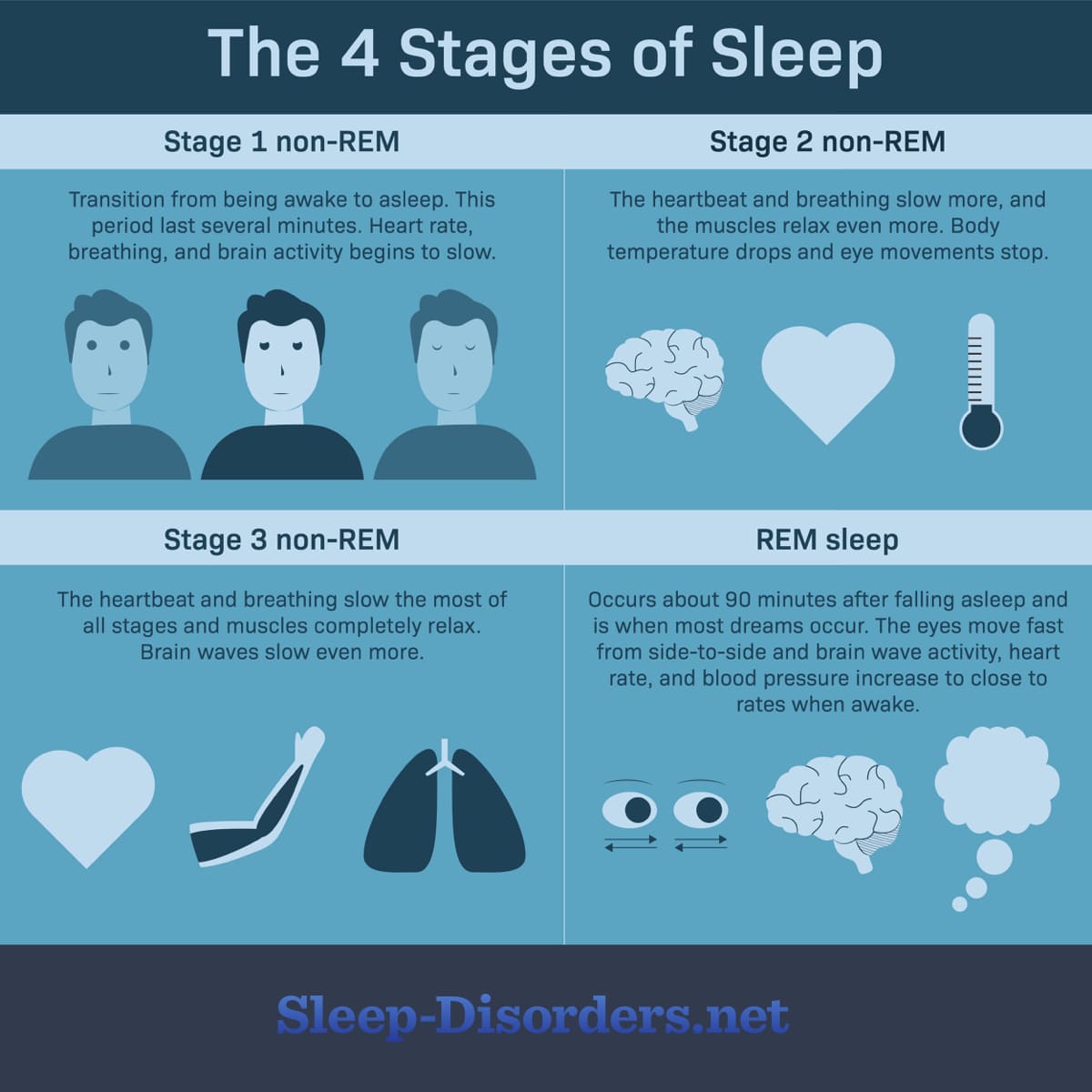What Is Sleep?
Reviewed by: HU Medical Review Board | Last reviewed: June 2020 | Last updated: March 2023
Humans spend about one-third of their lives asleep. It is a body function as important as food and water in keeping you healthy and alive. Everyone needs sleep, though doctors do not fully understand why. They do know that sleep affects the whole body, including the brain, heart, lungs, immune system, and mood.
The body and sleep
Several parts of the brain work together to control sleep, including the:1
- Hypothalamus, a group of nerve cells deep in the brain that helps our bodies move from wake to sleep by turning off the signals that make us stay awake
- Brain stem, works with the hypothalamus to control changes between sleep and wake
- Thalamus, relays information from the senses to the cerebral cortex (outer part of the brain)
- Cerebral cortex, which interprets and processes information from short- term to long-term memory
- Pineal gland, involved in the production of melatonin, a hormone that helps put you to sleep when it gets dark
- Basal forebrain, which promotes sleep and waking
- Amygdala, which helps processes emotions
Together, these parts of the brain work with your body’s biological clock to control what are called circadian rhythms and sleep-wake homeostasis. Circadian rhythms control body temperature, metabolism, and hormones to make you sleepy at night and wake up in the morning. These rhythms tend to work on a 24-hour cycle. Homeostasis tracks your need for sleep.
Types of sleep
There are 2 types of sleep:
- Rapid-eye movement (REM), which is when most dreams occur
- Non-REM, which has 3 stages, including the deepest sleep
During normal sleep, a person cycles through REM and non-REM stages 3 to 5 times. Sleep disorders may disrupt these normal cycles.2
The 4 stages of sleep
There are 4 stages in a normal sleep cycle with each stage tied to certain brain waves and brain cell activity.
Stage 1 (or N1)
Stage 1 non-REM (or N1) is the transition from being awake to falling asleep. This short period lasts several minutes while your heartbeat, breathing, eye movements, and brain waves slow. Your muscles relax, sometimes with a random twitch. This is the lightest stage of sleep.
Stage 2 (or N2)
Stage 2 non-REM (or N2) is the transition stage between very light sleep and deep sleep. The heartbeat and breathing slow more, and the muscles relax even more. The brain waves slow too, but with short bursts of electrical activity.
Stage 3 (or N3)
Stage 3 non-REM (or N3) is often called deep sleep. This is when your heartbeat and breathing slow the most, and the muscles are completely relaxed. Brain waves continue to slow.
Stage 4 REM sleep
Stage 4 REM sleep first happens about 90 minutes after falling asleep. Most dreams occur during REM. The eyes move fast from side to side under the eyelids. Brain wave activity, heart rate, and blood pressure increase to levels close to that seen when a person is awake. Breathing becomes faster and inconsistent. Arm and leg muscles become paralyzed so you cannot act out your dreams.
Figure 1. Stages of sleep
Why is sleep important?
People once thought sleep was simply a time when the body and brain “turned off.” But, doctors now know that sleep performs an important role in overall health. When a person does not get enough quality sleep, it makes them tired, but also impacts physical and mental health, and thinking.
Sleep is not yet fully understood, but doctors believe:1,2
- Sleep impacts how nerve cells in the brain interact with one another
- Sleep may act as a housekeeper, removing toxins in the brain
- Sleep may contribute to muscle growth and cell repair
- Sleep plays a role in the ability to think, learn new things, process information, and remember
- Sleep plays a part in the brain development of children
How much sleep do you need?
The amount of sleep you need changes over a lifetime. The Centers for Disease Control and Prevention (CDC) recommends the following amount of sleep per day:3
- Infants (4 to 12 months): 12 to 16 hours
- Toddlers (1 to 2 years): 11 to 14 hours
- Preschoolers (3 to 5 years): 10 to 13 hours
- School-age children (6 to 12 years): 9 to 12 hours
- Teenagers (13 to 18 years): 8 to 10 hours
- Adults (18 to 60 years): at least 7 hours
- Older adults (61 to 64 years): 7 to 9 hours
- Seniors (65+ years): 7 to 8 hours
